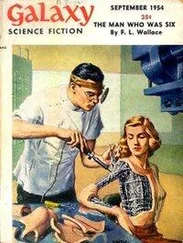“How long does it take? With all those villages, you and the other thirty-six…”
“This one won’t take long,” the chief declared, with a knowing leer.
“Good luck, chief,” said Sheldon and watched him walk away.
“What’s going on?” asked Greasy.
“Let’s get out of here,” said Sheldon. “I have work to do.”
Hart hit the ceiling when he learned the kind of work that Sheldon had to do.
“You can’t third-degree my men!” he shouted. “I won’t have it. They haven’t done a thing.”
“Master Hart,” said Sheldon, “you will have the men line up. I’ll see them in my quarters, one at a time, and I won’t third-degree them. I just want to talk to them.”
“Mister Co-ordinator,” said Hart, “I’ll do the talking for them.”
“You and I, Master Hart,” said Sheldon, “did our talking last night. Much too much of it.”
For hours on end, Sheldon sat in his cubbyhole while the men filed in one at a time and answered the questions that he shot at them:
“What questions did the Googles ask you?”
“How did you answer them?”
“Did they seem to understand?”
Man by man the notes piled up, and at last the job was done.
Sheldon locked the door, took a bottle from his desk and had a liberal snort; then he put the bottle back again and settled down to work, going through the notes.
The communicator beeped at him.
“The scouts are in,” said Hart’s voice, “and every single village has one of those cubes set up in front of their god-house. They’re sitting around it in a circle and they seem to be playing some sort of game. Every once in a while someone gets up from the circle and makes a move on one of the planes in the cube and then goes back and sits down again.”
“Anything else?”
“Nothing else,” said Hart. “That was what you wanted, wasn’t it?”
“Yes,” said Sheldon, “I guess that was what I wanted.”
“Tell me one thing,” asked Hart. “Who are they playing?”
“They’re playing one another.”
“One another what?”
“The villages,” said Sheldon. “The villages are playing against one another.”
“You mean thirty-seven villages?”
“That’s what I mean.”
“Would you tell me just how in hell thirty-seven villages can play one single game?”
“No, I can’t,” said Sheldon. But he had the terrible feeling that he could. That he could make a guess at least.
When it had become apparent that the retrogression was a planned affair, he remembered, he had wondered about the problem of communications which would have been necessary to have thirty-seven villages simultaneously retrogress. It would have taken, he had told himself, a higher order of communications than one would expect to find in a Type 10 culture.
And here it was again—an even tougher communications job, an odd, round-robin game in which these same thirty-seven villages played a game upon a complicated board.
There is one answer for it, he told himself. It simply couldn’t be, but there is no other answer for it— telepathy— and that is almost unthinkable in a Type 10 culture, let alone a Type 14.
He clicked off the squawk box and went back to work. He took a large sheet of paper to serve as a master chart and thumbtacked it to the desk, then started on the notes, beginning with the top one and going through to the very last. And when he had finished the chart, he sat back and looked at it, then put in a call for Hart.
Five minutes later Hart climbed the stairs and knocked at the door. Sheldon unlocked it and let him in. “Sit down, Hart,” he said.
“You have something?”
“I think I have,” said Sheldon. He gestured at the sheet thumbtacked on the desk. “It’s all there.”
Hart stared at the chart. “I don’t see a thing.”
“Last night,” said Sheldon, “we went to the Google pow-wow, and in the short time we spent there, we gave that particular village the most complete and comprehensive outline of a Type 10 culture that you have ever seen. But what really scares me is that we went somewhere beyond Type 10. I haven’t worked it out completely, but it looks nearer Type 9M than Type 10.”
“We what?”
“They pumped it out of us,” said Sheldon. “Each of our men was questioned about certain cultural matters, and in not a single instance was there duplication. Each of the set of questions asked was a different set of questions. Just as if those Googles were assigned certain questions.”
“What does it mean?” asked Hart.
“It means,” said Sheldon, “that we have interfered in one of the slickest social setups in the entire galaxy. I hope to God…”
“Slick social setup! You mean the Googles?”
“I mean the Googles,” Sheldon said.
“But they never amounted to anything,” Hart said. “They never will amount to anything. They…”
“Think hard,” said Sheldon, “and try to tell me what is the most outstanding thing about the Google culture. We have a history of five hundred years of trade with them. During those five hundred years there is one fact about them that sticks up like a bandaged thumb.”
“They’re dumb,” said Hart.
“Not from here, they aren’t.”
“They never got anywhere,” said Hart. “Weren’t even going anywhere, far as I could see.”
“That’s part of it,” said Sheldon. “Static culture.”
“I’ll be damned,” said Hart, “if I’ll play guessing games with you. If you have something on your mind…”
“I have peace on the mind,” said Sheldon. “In all the five hundred years we’ve known the Googles, there has been no dissension among them. They’ve never fought a war. That is something that cannot be said for any other planet.”
“They are just too dumb to fight,” said Hart.
“Too smart to fight,” said Sheldon. “The Googles, Master Hart, have done something no other people, no other culture, has ever been able to do in all galactic history. They’ve found a way in which to outlaw war!”
For thousands upon thousands of years, empire after empire had been built among the stars and upon the many planets that circled round the stars.
And one by one, lonely and beaten, each empire had fallen, and one by one other empires had risen to take their place and in their turn had fallen. And those that existed in this day would fall in time.
This is the old, old cycle, Sheldon told himself, the ancient disease of force and arrogance and desperation—the ageless pattern of cultural development .
Never had a day existed since the first beginning that there had not been war at one place or another within the galaxy.
War came about because of economic pressure, mostly, although there were other causes—the ambitions of a certain being or of a certain race, the strange death-wish psychology which bloomed in certain cultures, an overweening racism, or a religion that spoke in terms of blood and death, rather than in terms of love and life.
Break down the causes of war, Sheldon thought, and we would find a pattern—certain factors which made for war and certain other factors which made for victory, once war had been invoked.
Now, suppose we made a study of war, its causes and the winning of it. Suppose we worked out the relevant relationships which each factor held to all the other factors, and not only that, but the relevant power of certain groups of factors against other groups of factors—factors of racial ingenuity and technology, of the human spirit, of logistics, of cultural development and the urge to protect and retain that culture, and hatred or the capacity to hate, all the many factors, tangible and intangible, which went into the making and the winning of a war.
Читать дальше












